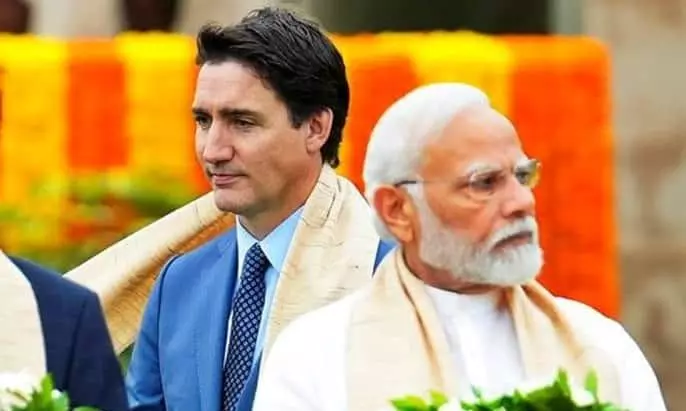
Nijjar killing: Canada ups the ante; Trudeau says it has shared credible proof with India
Tensions flared between India and Canada early this week following Trudeau's explosive allegations of the "potential" involvement of Indian agents in the killing of Khalistani extremist Nijjar

Prime Minister Justin Trudeau has said Canada has shared with India evidence of "credible allegations" about the involvement of Indian agents in the killing of Hardeep Singh Nijjar many weeks ago and wants New Delhi to "commit constructively" with Ottawa to establish the facts on this serious matter.
Tensions flared between India and Canada early this week following Trudeau's explosive allegations of the "potential" involvement of Indian agents in the killing of Khalistani extremist Nijjar on his country's soil on June 18 in British Columbia.
India had designated Nijjar as a terrorist in 2020. India angrily rejected the allegations as "absurd" and "motivated" and expelled a senior Canadian diplomat in a tit-for-tat move to Ottawa's expulsion of an Indian official over the case.
"I just want to simply say that we've shared those allegations, those credible allegations with India for weeks. We are working with our partners," Trudeau said on Friday in a press conference with the visiting Ukrainian President Volodymyr Zelenskyy.
"And what we are asking is for India, to commit constructively with Canada to establish the facts on this situation. We're there to work with them. And we have been for weeks now," Trudeau said in response to a question.
"Canada has shared the credible allegations that I talked about on Monday with India. We did that many weeks ago...We hope that they engage with us so that we can get to the bottom of this very serious matter. That's important," he said.
On Thursday, India asked Canada to come down hard on terrorists and anti-India elements operating from its soil and suspended visa services for Canadians, as escalating tensions between the two nations over the killing of Nijjar pushed their ties to an all-time low.
India also asked Canada to downsize its diplomatic staff in the country, arguing that there should be parity in strength and rank equivalence in the mutual diplomatic presence. The size of Canadian diplomatic staff in India is larger than what New Delhi has in Canada.
When asked about Canada sharing any information in the case with India, the Ministry of External Affairs (MEA) in New Delhi said: "No specific information has been shared by Canada on this case, either then or before or after. We have, you know, as we have said, or I think we have made very clear, we are willing to look at any specific information." "We have conveyed this to the Canadian side and made it clear to them that we are willing to look at any specific information that is provided to us. But so far we have not received any such specific information," MEA Spokesperson Arindam Bagchi said in New Delhi.
India also said it has very "specific evidence" about criminal activities by individuals based on Canadian soil and it has been shared with the Canadian authorities on a regular basis but has not been acted upon.
Canada's allegations of India's involvement in the killing of a Sikh separatist in Surrey that sparked a diplomatic row between the two nations are based on both human and signals intelligence and inputs from an ally from Ottawa’s Five Eye intelligence network, a media report has said citing the Canadian government sources.
According to a report in the media, Canada's allegations of India's involvement in the killing of Nijjar are based on both human and signals intelligence and inputs from an ally from Ottawa’s Five Eye intelligence network. The Canadian government has amassed both human and signals intelligence in a months-long investigation, the Canadian Broadcasting Corporation reported.
The Canadian government has not released its evidence and has suggested it could emerge during an eventual legal process.

